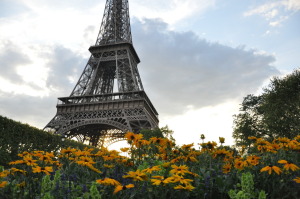France seduces travellers with its unfalteringly familiar culture, woven around cafe terraces, village-square markets and lace-curtained bistros with their plat du jour chalked on the board.
Remember how your parents used to tell you to keep your elbows off the table during meals? Or that it’s rude to slurp your soup? Well there’s good news, these American cultures and customs don’t always translate to other countries! While the local people you meet won’t expect you to be fluent in their language, culture and customs, it is important to familiarize yourself with them.
Do you know how kissing, snoring and other things sound in other languages? That’s right, even sound effects can be translated!
The most important thing to remember while you’re abroad is that things will be different. But, different doesn’t mean wrong. Be open, be curious, and read more about the culture you will be stepping into. Get excited about LIVING the life you’ve only dreamt and read about until now!
#CISAlumniTip
“Do your best to fully immerse yourself in the culture and take advantage of the opportunities abroad. This is your chance to experience many new things: new people, new food, new places, new traditions, new languages, new everything! Even if you feel physically or emotionally tired, get out there, leave your fear at home, and bring a positive attitude. Don’t take anything for granted. Even the most seemingly insignificant experience will become a highly valuable memory in the future.” – Debora C., Intern in Barcelona Alumna.
#CISabroadtip: Do some more research into the French customs you’ll experience while abroad.
Cultural Savoir Faire
France is about world-class art and architecture, outstanding museums, Roman temples and Renaissance châteaux. It seduces with both iconic landmarks known the world over and rising stars yet to be discovered. This country’s cultural repertoire is staggering – in volume and diversity. And this is where the beauty of la belle France lies: when super stars like Mademoiselle Eiffel, royal Versailles and the celebrity-ridden French Riviera have been ticked off, there’s still plenty more to thrill. (France is, after all, the world’s top tourist destination, with more than 80 million visitors a year.)
Art de Vivre
The rhythm of daily life – dictated by the seasons in the depths of la France profonde (rural France) – exudes an intimacy that gets under your skin. Don’t resist. Rather, live the French lifestyle. Embrace the luxury of simple, everyday rituals being transformed into unforgettable moments, be it a coffee and croissant in the Parisian cafe where Sartre and Simone de Beauvoir met to philosophise, a stroll through the lily-clad gardens Monet painted, or a walk on a beach in Brittany scented with the subtle infusion of language, music and mythology brought by 5th-century Celtic invaders.
Gastronomy
Food is of enormous importance to the French, and each region has its own specialities alongside French classics. The daily culinary agenda takes no prisoners: breakfasting on warm croissants from the boulangerie, stopping off at Parisian bistros, and shopping at the market are all second nature to the French – and it really would be rude to refuse. But French gastronomy goes far deeper than just eating exceedingly well. Its experiential nature means there is always something tasty to observe, learn and try, wherever you are – be it flipping crepes in Brittany or chinking Champagne flutes in ancient Reims cellars, the culinary opportunities are endless.
Read more: http://www.lonelyplanet.com/france#ixzz3JjACwhxt
Non-verbal communication:
The French greet each other with a kiss on each cheek. It’s actually less of a kiss and more of a cheek high-five. Knowing when to kiss and when not to kiss is easy if you just follow the example of the person you are greeting. It is quite comical to see large groups greet one another, with everyone giving kisses and exchanging pleasantries, it can take quite a while to greet everyone. Even if it takes a while, it is often seen as a bit rude if you do not say hello to everyone when arriving.
-
An arm’s length distance or a bit closer is an appropriate amount of personal space.
-
Given the close nature of the French greeting with kisses, the French are generally more at ease maintaining personal space.
-
The French may seem reserved upon first meeting. However, during subsequent meetings, touching during a conversation is acceptable and considered a sign of affection.
While heated conversations about food and politics are commonplace, it is taboo to talk about money. You can ask what someone does for a living, but it is not acceptable to ask how much someone makes.
For more information on non-verbal communication, check out Culture Crossing.
Greetings:
This is a great place to list those basics, the “101” if you will of the local language.
- Hello Bonjour!
- Thank you Merci!
- Excuse me Excusez-moi
- You’re welcome Je vous en prie!
- How are you? Comment allez-vous?
- I am well Je vais bien….
- How’s it going? Ca va?
- It’s going well. Oui, ca va!
- I am looking for… Je cherche…
- Stop Arretez!
- Go, etc… Allez…..
Other customs to be familiar with:
In France, there are many customs associated with eating and drinking. When invited to dinner, it is a good idea to bring flowers instead of wine since the host usually takes great care to select a wine that will go well with the meal. Meals are generally served in several different courses beginning with an ‘aperatif’, or drink and a snack, and ending with cheese and dessert. During each course, it is considered polite to take a second helping, even if it’s small, otherwise your host might assume that you didn’t find the plate as delicious he might have hoped. It is also customary to always finish everything on your plate (which shouldn’t be hard because French cuisine truly the best in the world) !
Tipping
While the food is phenomenal, restaurant service leaves something to be desired. Meals often last several hours at a time and waiters are careful to make their presence as unobtrusive as possible. In general, you don’t need to tip members of the service industry unless they do provide excellent service since they make a fair wage already. But, if they do a great job, give fun recommendations, or are particularly accommodating, feel free to tip them a few euros as a thank you!







